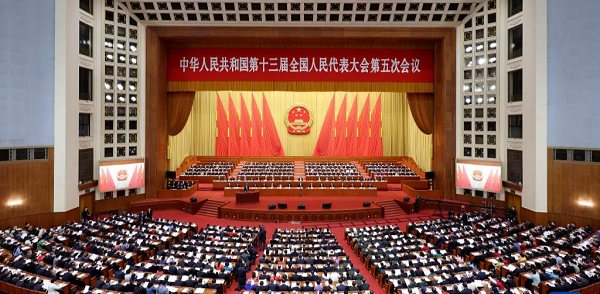NPC deputies, political advisors participate in two sessions

The fifth session of the 13th National People's Congress (NPC) is held on March 5 at the Great Hall of the People. [Photo/WeChat account of Optics Valley of China]
The fifth session of the 13th National Committee of the Chinese People's Political Consultative Conference (CPPCC) and the fifth session of the 13th National People's Congress (NPC) were convened on March 4 and 5, respectively, attracting national attention.
NPC deputies and national political advisers from Wuhan East Lake High-tech Development Zone (also known as Optics Valley of China, or OVC), including Ma Xinqiang, Chen Yilong, Yan Dapeng, Yu Qingming, and Li Jie, made their voices heard during the national events.
Ma Xinqiang, a national legislator and president of HGTECH Co – the first laser-based hi-tech company to go public in China – highlighted OVC's powerful optoelectronic information sector, which boasts a solid foundation for the further combination of digital economy and equipment manufacturing industry.
Ma suggested that the "optics, IC, displays, terminals and internet" industrial cluster needs to be made more open to the world through China's role in the Regional Comprehensive Economic Partnership and strengthened collaboration with foreign countries in trade and innovation.
Yan Dapeng, an NPC deputy and vice president of Wuhan Raycus Fiber Laser Tech, suggested that efforts be made to build high-quality professional talent teams by carrying out more industry-education integration programs. Yan was also in favor of enterprises, especially State-owned ones, establishing vocational schools and encouraging social capital to take part in this kind of education.
Li Jie, a national legislator and president of Healthcare Group Co, advised extending the validity period of market exclusivity rights for generic drugs that have been patented and allowed to enter the market as the first of their kind. He suggested extending the period from the original 12 months to 24 months, giving enterprises involved more time to offset the huge R&D costs.
Other suggestions and proposals included enhancing criminal protection for commercial secrets and increasing incomes and incentives for frontline workers.


